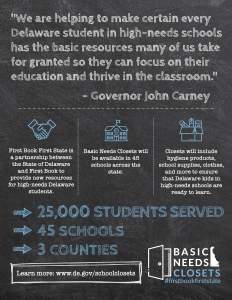Delaware partners with organizations, hospitals to stock closets in 45 Delaware schools
BRIDGEVILLE, Del. – Governor John Carney on Thursday announced an initiative to stock basic needs closets in 45 high-needs Delaware schools. The closets will receive supplies in time for the start of the school year thanks to the coordinated efforts of Delaware educators, Delaware businesses, Delaware healthcare institutions, and a partnership with the nonprofit First Book.
Governor Carney showcased the closets at three schools – one in each county – to highlight the impact these free supplies will have on Delaware students and families. Educators at Highlands Elementary School in the Red Clay Consolidated School District, Towne Point Elementary School in the Capital School District, and Phillis Wheatley Elementary School in the Woodbridge School District hosted Thursday’s events.
“Students face tremendous obstacles to doing their best in school when their basic needs are not met,” said Governor Carney. “By coordinating resources throughout the state, we are helping to make certain every Delaware student in high-needs schools has the basic resources many of us take for granted so they can focus on their education and thrive in the classroom. Thank you to all of our partners who helped make this a reality for Delaware students.”
Delaware’s basic needs closets will provide elementary and middle school students across the state with increased access to free products designed to meet students’ needs so they can effectively participate in class. Each school’s basic needs closet will be stocked with products identified by districts and charter schools as essential to the wellbeing of their students, including hygiene products, school supplies, clothes, and more. Students will be able to discreetly access the closets throughout the school year.
Delaware healthcare institutions and businesses statewide donated funding for the closets, including Christiana Care, Bayhealth, Nemours, Incyte, Nanticoke, and Beebe Health Systems, as well as Cover Rossiter, EDiS, and Drinker Biddle. Delaware partnered with the nonprofit First Book to purchase the basic needs products at a reduced rate, as a part of the First Book First State partnership.
Delawareans can visit www.de.gov/schoolclosets to learn how to help.
Follow news about the Basic Needs Closets initiative on social media using the hashtag #firstbookfirststate.
“Since we know that disadvantaged students benefit academically when their basic needs are met, we are truly grateful to have more of these resources available for Delaware schools,” said Dr. Susan Bunting, Secretary of the Delaware Department of Education. “Our goal is to assure that educators have needed supports so they can prepare all students for long-term success.”
The Governor’s focus on meeting students’ basic needs demonstrates the state’s commitment to supporting the needs of Delaware’s students to help them learn and thrive in school, which is part of the Governor’s broader education policy.
The Delaware Department of Education will be supporting the Basic Needs Closets initiative. Governor Carney in July announced the creation of the Innovation and Improvement office, which will support educators and students in high-needs schools, especially those in the City of Wilmington.
“Our primary goal is to determine school needs and then coordinate supports and resources for students and families so that all students can come to school ready to learn,” said the new Director of Innovation and Improvement Dorrell Green. “To make certain students and families in high-needs schools have what they need to be successful in the classroom, none of us can operate alone.”
Delaware districts and charter schools have also welcomed the basic needs closets as they look for new ways to meet the diverse needs of their students.
“One of the biggest challenges we face in education is children coming to school unprepared to succeed academically,” said Capital School District Superintendent Dan Shelton. “When we can address the immediate concerns first, we give students a greater opportunity to learn and, in turn, provide our teachers with better classroom environments that help every student.”
Reaction from Basic Needs partners to Thursday’s announcement:
“We are extremely grateful for the support from the Governor’s office and area partners for their support of students at Highlands Elementary School,” said Red Clay Consolidated School District Superintendent Merv Daugherty. “The Basic Needs Closet will assist students with supplies to benefit their academic growth in the classroom.”
“We are excited to have been chosen as one of the schools that will receive a Basic Needs Closet,” said Heath Chasanov, Superintendent of Woodbridge School District and the 2017-18 President of the Chief School Officers Association. “At Woodbridge, we have always recognized that a student’s physical and emotional needs must be addressed if they are going to have success in the classroom. This closet will help compliment a number of programs that we have already established that consider all of the needs of our students.”
“We’re very fortunate to have a basic needs closet here at Towne Point,” said Toriano Giddens, Principal of Towne Point Elementary. “Things like food, clothing, and toiletries that many people take for granted, are the same things that many of our students struggle to obtain. So it’s rewarding to be in a position to instantaneously provide some of those items to our students in need. More importantly, when a child’s basic needs are met, they can focus on learning. This is one of the ways we are meeting the needs of the whole child while fulfilling one of the intents of the Capital School District’s strategic plan.”
“Highlands is thrilled to be the recipient of a Basic Needs Closet for our students and their families,” said Highlands Elementary School Principal Barbara Land. “Our school mission is ‘Excellence for every child, every minute, every day, to accelerate achievement and prepare students for life…Together.’ The supplies provided by generous donors helps to ensure that our students are supported and ready to learn. It really does take a village and we are so grateful for Governor Carney’s support.”
“Providing access for our students to basic needs – such as clothing, school supplies, and food – can make a real difference in their ability to learn at school,” said Principal of Phillis Wheatley Elementary School Principal Lynn Brown. “We tell our students that education is the key to their bright future, and that with hard work and dedication they can accomplish anything. Not having clothing, food, or materials to work with can get in the way of their success, and we cannot thank you enough for your efforts to bridge the gaps and support us with your commitment to the children of Sussex County through donating these important items.”
“As a not-for-profit health system, Bayhealth is committed to fulfilling its mission ‘to strengthen the health of our community, one life at a time’,” explained Bayhealth Senior Vice President and Chief Financial Officer Mike Tretina. “We honor our community by supporting the Basic Needs Closet in local schools where Bayhealth offers Wellness Centers.”
“When kids lack the most basic needs, including clothing and hygiene, their self-esteem and school attendance suffers,” said Kyle Zimmer, President and CEO of First Book. “Heroic teachers try to bridge the gap in resources — but the need is too great. We applaud the State of Delaware — led by Governor John Carney — for fulfilling these essential needs. This kind of leadership is a critical step in ensuring that all kids have the equal access to a quality education that they deserve.”
“Incyte is proud to partner with the State of Delaware on its Basic Needs Closets initiative,” said Paula Swain, Incyte’s Executive Vice President of Human Resources and Chair of the Incyte Charitable Giving Foundation. “Serving our community and creating positive change is an integral part of our culture. As a company rooted in science, we believe that by helping provide basic necessities to future innovators, they will be better able to focus on education and making a positive impact in our society.”
“Christiana Care is proud to support the Basic Needs Closets Initiative, and we appreciate this opportunity to partner with Governor Carney to support students and families at schools across our community,” said Janice E. Nevin, M.D., MPH, president and Chief Executive Officer of Christiana Care Health System. “Our commitment to serving our neighbors includes making sure students have what they need to succeed in school, so they can get a good education and lead healthy lives. This program is an innovative example of how we can combine Christiana Care’s commitment to serving our community with the support of other partners in a State-led initiative to address the pressing needs of those we serve – clothing, food and personal care items.”
“At Beebe Healthcare we know from our work in population health that social determinants, like the level of one’s education, can influence our overall health as much, if not more, than many medical interventions and treatments,” said Jeffrey M. Fried, FACHE, President and CEO of Beebe Healthcare. “We think the idea of a basic needs closet for students is a wonderful way to help ensure our students are able to thrive and succeed in a learning environment. We applaud Governor Carney and his administration for creating the Basic Needs Closet for Delaware’s students, and we are pleased to be a partner to help support this wonderful program.”
“Our community’s health is a priority for Nanticoke, as it is for all of Delaware’s hospitals. The Basic Needs Closet is one more way for us to connect with and support our community,” said Thomas Brown, Senior Vice President of Nanticoke Health Services. “Before she died, my wife Pegeen taught in the Woodbridge School District. Through her work I saw how much she and other teachers provided to young people out of their own pockets. So, I know firsthand how important this project is and the daily impact it will make on the lives of these teachers and students. They will absolutely benefit from the resources these closets will provide. The Nanticoke family will be supporting this effort on multiple levels, through support from our employees, medical staff and community partners. Additionally, the organization will support this project through its Pegeen and Samantha Brown Pediatric Fund, providing an additional resource to help ensure the closets in our community have what they need. Pegeen would be thrilled that the fund in her and our daughter’s memory would help children in the school system that meant so much to her. Nanticoke Health Services is thrilled as well.”
“Nemours is happy to support Governor John Carney and the Basic Needs Closet Initiative,” said Roy Proujansky, MD, Nemours Executive Vice-President, Chief Executive, Nemours Delaware Valley Operations. “Nemours Children’s Health System is focused on improving the health of children through clinical care as well as programs that ensure they have the tools necessary to live healthy, productive lives. This Initiative is a fundamental form of preventative care that will have a positive impact on children in the surrounding areas and we are excited to be a part of such a great effort.”
###

